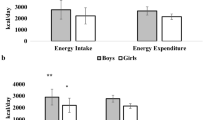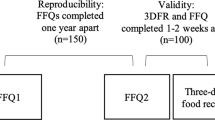Abstract
Objective:
To determine the minimum number of days of dietary intake interviews required to reduce the effects of random error (day-to-day variability in dietary intake) when using the multiple-pass, multiple-day, 24-h recall method.
Design:
Cross-sectional study.
Setting:
University research department.
Subjects:
A total of 50 healthy non-smoking overweight and obese (body mass index=26–40 kg/m2) adult men and women aged 39–45 years completed the study. Participants were randomly selected from volunteers for a larger unrelated study.
Interventions:
Each participant completed 10, multiple-pass, 24-h recall interviews on randomly chosen days over 4 weeks. The minimum number of record days was determined for each macronutrient (carbohydrate, fat, protein) and energy, for each gender, to obtain a ‘true’ (unobservable) representative intake from reported (observed) dietary intakes.
Results:
The greatest number of days required to obtain a ‘true’ representative intake was 8 days. Carbohydrate intakes required the greatest number of days of dietary record among males (7 days), whereas protein required the greatest number of days among females (8 days) in this cohort. Sunday was the day of the week that showed greatest variability in macronutrient intakes. Protein (P<0.05) and fat (P<0.001) intakes were significantly more variable than carbohydrate on Sundays compared with weekdays, for both men and women.
Conclusion:
A logistically achievable 8 days of dietary intake interviews was sufficient to minimize the effect of random error when using the multiple-pass, 24-h recall dietary intake method. Sunday should be included among the dietary interview days to ensure a ‘true’ representation of macronutrient intakes. This method can be confidently applied to small cohort studies in which dietary intakes from different groups are to be compared or to investigations of associations between nutrient intakes and disease.
This is a preview of subscription content, access via your institution
Access options
Subscribe to this journal
Receive 12 print issues and online access
$259.00 per year
only $21.58 per issue
Buy this article
- Purchase on Springer Link
- Instant access to full article PDF
Prices may be subject to local taxes which are calculated during checkout
Similar content being viewed by others
References
Basiotis PP, Welsh SO, Cronin FJ, Kelsay JL, Mertz W (1987). Number of days of food intake records required to estimate individual and group nutrient intakes with defined confidence. J Nutr 117, 1638–1641.
Beaton GH (1994). Approaches to analysis of dietary data: relationship between planned analyses and choice of methodology. Am J Clin Nutr 59 Suppl, S253–S261.
Beaton GH, Burema J, Ritenbaugh C (1997). Errors in the interpretation of dietary assessments. Am J Clin Nutr 65 Suppl, S1100–S1107.
Bellisle F (1999). Food choice, appetite and physical activity. Public Health Nutr 2, 357–361.
Bingham SA (1987). The dietary assessment of individuals; methods, accuracy, new techniques and recommendations. Nutr Abstr Rev (Series A) 57, 705–742.
Bingham SA (1991). Limitations of the various methods for collecting dietary intake data. Ann Nutr Metab 35, 117–127.
Bingham SA, Gill C, Welch A, Day K, Cassidy A, Khaw KT et al. (1994). Comparison of dietary assessment methods in nutritional; epidemiology: weighed food records v. 24h recalls, food frequency questionnaires and estimated-diet records. Br J Nutr 72, 619–643.
Black AE, Coles TJ, Wiles SJ, White F (1983). Daily variation in food intake of infants from 2 to 18 months. Hum Nutr: Appl Nutr 37, 448–458.
Block G, Hartman AM (1989). Issues in reproducibility and validity of dietary studies. Am J Clin Nutr 50, 1133–1138.
Dodd KW, Guenther PM, Freedman LS, Subar AF, Kipnis V, Midthune D et al. (2006). Statistical methods for estimating usual intake of nutrients and foods: a review of the theory. J Am Diet Assoc 106, 1640–1650.
Domas AJ, Tangney CC, Rosenson RS (1997). Determination of the minimum number of food records required to assess nutrient intake accurately. Am J Clin Nutr 65 Suppl, S1327–S1328 (abstract).
Grunwald GK, Sullivan DK, Hise M, Donnelly JE, Jacobsen DJ, Johnson SL et al. (2003). Number of days, number of subjects, and sources of variation in longitudinal intervention or cross-over feeding trials with multiple days of measurement. Br J Nutr 90, 1087–1095.
Guenther PM, DeMaio TJ, Ingwersen IA, Berlin M (1997). The multiple-pass approach for the 24-h recall in the Continuing Survey of Food Intakes by Individuals, 1994-1996. Am J Clin Nutr 65 Suppl, S1316.
Guyatt G, Walter S, Norman G (1987). Measuring change over time: assessing the usefulness of evaluative instruments. J Chron Dis 40, 171–178.
Haines PS, Hama MY, Guilkey DK, Popkin BM (2003). Weekend eating in the United States is linked with greater energy, fat, and alcohol intake. Obes Res 11, 945–949.
Hebert JR, Clemow L, Pbert L, Ockene IS, Ockene JK (1997). Role of social desirability in biasing estimates of nutrient intake. Am J Clin Nutr 65 Suppl, S1316–S1317.
Heitmann BL, Lissner L (1995). Dietary underreporting by obese individuals – is it specific or non-specific? BMJ 311, 986–989.
Jahns L, Carriquiry A, Arab L, Mroz TA, Popkin BM (2004). Within- and between-person variation in nutrient intakes of Russian and US children differs by sex and age. J Nutr 134, 3114–3120.
Johansson L, Solvoll K, Gunn-Elin AB, Drevon CA (1998). Under- and overreporting of energy intake related to weight status and lifestyle in a nationwide sample. Am J Clin Nutr 68, 266–274.
Johnson RK (2002). Dietary Intake – how do we measure what people are really eating? Obes Res 10 Suppl, S63–S68.
Jonnalagadda SS, Mitchell DC, Smiciklas-Wright H, Meaker K, Van Heel N, Karmally W et al. (2000). Accuracy of energy intake data estimated by a multiple pass, 24-h dietary recall technique. J Am Diet Assoc 100, 303–311.
Kerver JM, Yang EJ, Obayashi S, Bianchi L, Song WO (2006). Meal and snack patterns are associated with dietary intake of energy and nutrients in US adults. J Am Diet Assoc 106, 46–53.
Lissner L, Habicht J-P, Strupp BJ, Levitsky DA, Haas JD, Roe DA (1989). Body composition and energy intake: do overweight women overeat and underreport? Am J Clin Nutr 49, 320–325.
McLennan W, Podger A (1999). National Nutrition Survey: Foods Eaten, Australia, 1995. Australian Bureau of Statistics: Canberra.
Mertz W (1992). Food intake measurements: is there a ‘gold standard’? J Am Diet Assoc 92, 1463–1465.
Mirmiran P, Esmaillzadeh A, Azizi F (2006). Under-reporting of energy intake affects estimates of nutrient intakes. Asia Pac J Clin Nutr 15, 459–464.
Nelson M, Black AE, Morris JA, Cole TJ (1989). Between- and within-subject variation in nutrient intake from infancy to old age: estimating the number of days required to rank dietary intakes with desired precision. Am J Clin Nutr 50, 155–167.
Palaniappan U, Cue RI, Payette H, Gray-Donald K (2003). Implications of day-to-day variability on measurements of usual food and nutrient intakes. J Nutr 133, 232–235.
Poppitt SD, Swann D, Black AE, Prentice AM (1998). Assessment of selective under-reporting of food intake by both obese and non-obese women in a metabolic facility. Int J Obes 22, 303–311.
Post B, Kemper HCG, Storm-van Essen L (1987). Longitudinal changes in nutritional habits of teenagers: differences in intake between schooldays and weekend days. Br J Nutr 57, 161–176.
Potosky AL, Block G, Hartman AM (1990). The apparent validity of diet questionnaires is influenced by number of diet-record days used for comparison. J Am Diet Assoc 90, 810–813.
Robertson C, Conway R, Dennis B, Yarnell J, Stamler J, Elliott P (2005). Attainment of precision in implementation of 24-h dietary recalls: INTERMAP UK. Br J Nutr 94, 588–594.
Spiegelman D, McDermott A, Rosner B (1997). Regression calibration method for correcting measurement-error bias in nutritional epidemiology. Am J Clin Nutr 65 (Suppl), S1179–S1186.
Tapsell LC, Brenninger V, Barnard J (2000). Applying conversation analysis to foster accurate reporting in the diet history interview. J Am Diet Assoc 100, 818–824.
Vuckovic N, Ritenbaugh C, Taren DL, Tobar M (2000). A qualitative study of participant's experiences with dietary assessment. J Am Diet Assoc 100, 1023–1028.
Westerterp-Plantenga MS, Ijedema MJ, Wijckmans-Duijsens NE (1996). The role of macronutrient selection in determining patterns of food intake in obese and non-obese women. Eur J Clin Nutr 50, 580–591.
Acknowledgements
Participants for this study were randomly selected from a larger strategic links with industry project, which was financially sponsored by Polar Electro Oy. AP Hills and NM Byrne were principal investigators for this larger project.
Author information
Authors and Affiliations
Corresponding author
Additional information
Contributors: KAJ was the principal investigator for the study, which was conducted as part fulfillment for the Doctor of Philosophy at the Queensland University of Technology. Co-author APH is the principal supervisor for the principal investigator's PhD candidature, and NMB and AMM are associate supervisors. KAJ was responsible for the conception, design, conduct of the experiment, data analysis and interpretation, and writing of the paper. APH and NMB provided advice on study design, data interpretation and statistical analyses, and support for participant recruitment. AMM provided advice on study design and data interpretation. APH gave final approval of the paper.
Rights and permissions
About this article
Cite this article
Jackson, K., Byrne, N., Magarey, A. et al. Minimizing random error in dietary intakes assessed by 24-h recall, in overweight and obese adults. Eur J Clin Nutr 62, 537–543 (2008). https://doi.org/10.1038/sj.ejcn.1602740
Received:
Revised:
Accepted:
Published:
Issue Date:
DOI: https://doi.org/10.1038/sj.ejcn.1602740
Keywords
This article is cited by
-
Dietary acid load in health and disease
Pflügers Archiv - European Journal of Physiology (2024)
-
The relationship between sleep- and circadian rhythm-related parameters with dietary practices and food intake of sedentary adults: a cross-sectional study
Sleep and Biological Rhythms (2024)
-
What do Australian adults eat for breakfast? A latent variable mixture modelling approach for understanding combinations of foods at eating occasions
International Journal of Behavioral Nutrition and Physical Activity (2021)
-
The complexities of the diet-microbiome relationship: advances and perspectives
Genome Medicine (2021)
-
Proton pump inhibitors as risk factor for metabolic syndrome and hepatic steatosis in coeliac disease patients on gluten-free diet
Journal of Gastroenterology (2018)



